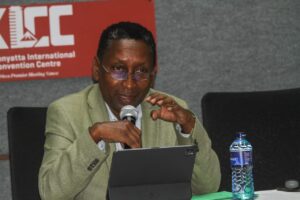KEPSA Signs the Regional Economic Blocs Public Private Dialogue Mechanism
The Kenya Private Sector Alliance (KEPSA) has today officially signed a landmark Memorandum of Understanding (MoU) with Kenya’s six Regional Economic Blocs. This adds to other KEPSA public-private dialogue mechanisms with the different arms of the public sector, including the Presidential Economic Dialogue, the Speakers Roundtable with the National Assembly and the Senate, and the Chief Justice Roundtable, among others.
The partnership agreement was made in Voi, Taita Taveta, on the sidelines of the 6th Jumuiya Agribusiness and Blue Economy Investment Conference (JABEIC), and witnessed by H.E. Gideon Mung’aro, OGW, Governor of Kilifi County and Chairperson of the Jumuiya ya Kaunti za Pwani. It formed the engagement mechanism of devolving KEPSA to the counties through the six regional economic blocs.
“I am incredibly grateful to be present today, to represent the six Counties of Mombasa, Kwale, Kilifi, Tana River, Lamu, and Taita Taveta, as we join the other five economic blocs in signing this partnership with KEPSA. It will go a long way in driving inclusive development, reducing poverty levels, increasing job opportunities and private sector investments in the counties,” commended H.E Gideon Mung’aro, OGW, Kilifi County Governor and Chairperson, Jumuiya ya Kaunti za Pwani.
The MoU symbolizes the beginning of a new chapter in Kenya’s devolution journey. It will formalize a framework for sustainable economic growth, employment creation, and development through structured dialogues between the public and private sectors.
“It marks a defining moment in our journey toward unlocking Kenya’s economic potential through devolution. Since the inception of devolution in 2013, counties have emerged as vital players in national development, contributing approximately 60% of Kenya’s GDP and serving as critical hubs for economic activity across various sectors. By embracing collaboration and innovation across all sectors, public or private, we can transform Kenya’s counties into beacons of progress,” emphasized Carole Kariuki, KEPSA CEO.
Over the years, KEPSA has collaborated with various county economic blocs such as Jumuiya ya Kaunti za Pwani (JKP), North Rift Economic Bloc (NOREB), and Lake Region Economic Bloc (LREB) to achieve tangible results that have positively impacted local economies:
“For instance, we have worked with Jumuiya ya Kaunti za Pwani (JKP) to strengthen climate-resilient agricultural practices. This included developing value chains for crops like cashew nuts and coconuts, resulting in a 15% increase in exports and enhanced farmer incomes,” said Carole, adding that the collaboration has also resulted in investments in irrigation infrastructure that have improved food security for over 50,000 households and reduced reliance on rain-fed agriculture. Training programs for farmers on sustainable practices have increased productivity by 20%.
With the North Rift Economic Bloc (NOREB), KEPSA has promoted maize value-addition initiatives that reduced post-harvest losses by 20%, directly increasing farmer earnings. Further, it supported implementing solar-powered irrigation systems benefiting over 10,000 farmers, enhancing agricultural productivity while promoting renewable energy use. The collaboration facilitated access to credit for agribusinesses through partnerships with financial institutions to ensure sustainable growth.
The partnership with the Lake Region Economic Bloc (LREB) in advancing Healthcare and Tourism established a regional health fund that improved healthcare access across member counties by 30%, ensuring that more citizens receive essential medical services. It also promoted eco-tourism initiatives that increased visitor numbers to key attractions like Lake Victoria by 25%, generating significant revenue for local economies. Awareness campaigns on health issues such as maternal health and communicable diseases were also launched to improve community health outcomes. These partnerships exemplify the power of aligning public sector goals with private sector expertise and resources.
“The private sector is driving Kenya’s economic growth, and our mandate through this partnership is to work together with the private sector through KEPSA to ensure we collectively increase the competitiveness of the six economic blocs,” noted Jackson Ole Mpario, CEO of the MAA Economic Bloc.
Future engagements within the MoU will align local development goals with national priorities by leveraging real-time data-driven solutions facilitated by the Market Intelligence Hub and actionable insights, driving inclusive economic growth, investment, and sustainability across Kenya’s counties.
“The Market Intelligence Hub is a project by GIZ’s Digital Transformation Center Kenya, in partnership with KEPSA, to centralize data on public sector bankable projects. This will enable informed decision-making to tackle local challenges while maximizing investment opportunities across counties,” said Joash Gomba – Chief Technical Officer, Verus Africa.
Economic blocs represent a powerful strategy for scaling regional development. By pooling resources and harmonizing policies, these blocs can catalyze industrial growth and position Kenya as a global economic leader. Therefore, the agreement is a premise for the roll-out of the KEPSA-County Regional Economic Roundtable. This Public-Private Dialogue (PPD) platform will convene quarterly, rotating among the various County Economic Blocs, to foster targeted discussions on regional priorities, challenges, and opportunities in areas such as agribusiness, infrastructure development, education, healthcare, tourism, and MSME innovation.
KEPSA will appoint representatives in the six regions to coordinate businesses’ engagement in the regional economic bloc roundtables and public-private dialogues. The round tables will use same mechanism used at the national level with the presidential and speaker’s dialogues. During the Council of County Governors (COG) meeting, KEPSA will meet the blocks for progress reports every year. National issues raised by the blocks will be presented during the National roundtable platforms and closely monitored to ensure progress, accountability, and measurable impact.
“KEPSA’s partnership with the regional economic blocs will promote the establishment of common policies across the counties, facilitating increased investments from the private sector,” said Eng. Patrick Obath, Chairperson of KEPSA Foundation and International Chamber of Commerce- Kenya
As part of the event, KEPSA’s social arm, KEPSA Foundation, planted over 500 trees at the Taita Taveta National Polytechnic (formerly Coast Institute of Technology), Voi Campus. This initiative was conducted as part of the collaboration with Dow Chemicals and ChildFund to implement the Building Learning Opportunities with Orchard Management in Schools. It aims to regreen and establish orchards in schools within six counties: Taita Taveta, Makueni, Kirinyaga, Kiambu, Embu, and Tharaka Nithi. This initiative is anchored on KEPSA Foundation’s Kijani initiative, which falls under its priority area of Community Climate Action and Sustainability. This initiative seeks to enhance nutrition, increase tree cover, promote economic empowerment, and instill a sense of environmental responsibility within schools and surrounding communities.





